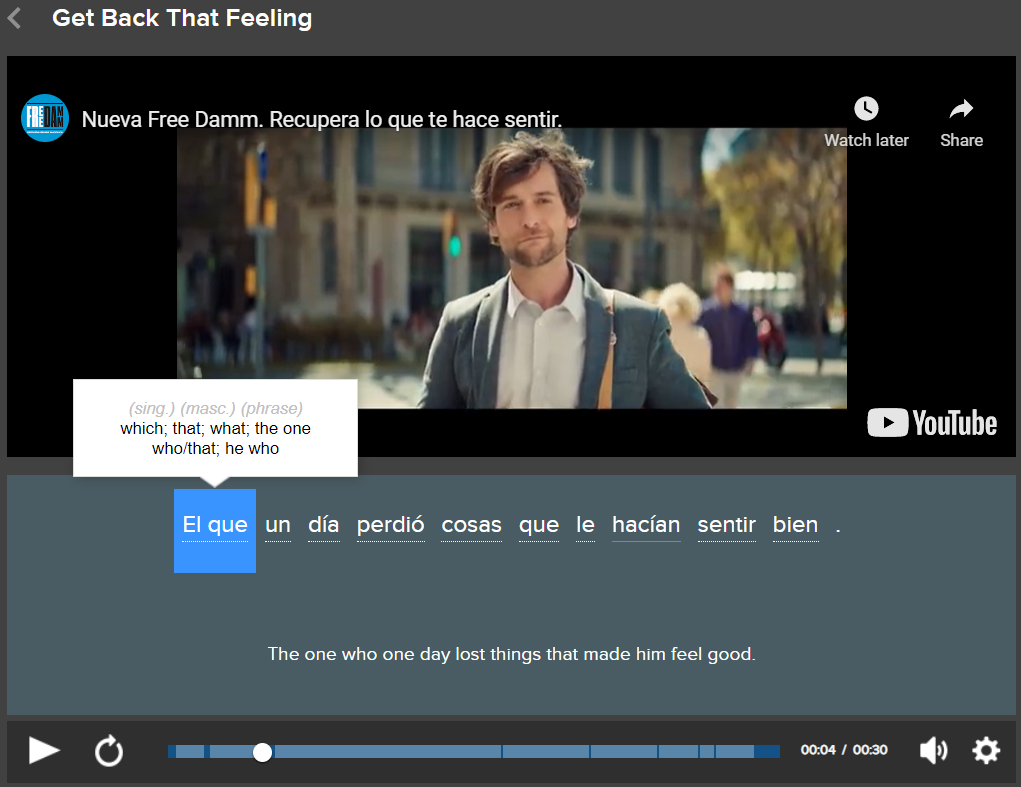How To Say Sad In Spanish

Spanish Feelings: fifty Ways to Better Express Your Emotions
Are you sick of expressing all of your opinions through sí (yep) and no (no), smiles, and grunts when talking with Spanish speakers?
Or are you past the basics and looking for advanced ways to express how you experience?
Though Spanish is a wonderfully expressive linguistic communication, trying to express your feelings equally a beginner or intermediate learner tin can be nothing short of frustrating.
Here are phrases to express emotions, from happiness to sadness and anger to surprise, so you can talk well-nigh your feelings in Spanish with ease!
Contents
- How to Express Happiness in Spanish
-
- 1. Estoy contento/a
- ii. Estoy feliz
- 3. Me alegro
- 4. Pasárselo pipa
- 5. Flipé, flipé en, flipé con
- 6. ¡Toma!
- How to Express Approval in Spanish
-
- seven. Me gusta/an
- 8. Me encanta/an
- 9. ¡Cómo mola!
- 10. Es la leche
- 11. Es una pasada
- 12. Qué salado/a
- 13. Majo/a
- How to Express Indifference in Spanish
-
- xiv. No importa/an
- 15. Me da igual
- 16. Como quieras
- 17. Estoy aburrido/a
- 18. Me importa tres pepinos
- 19. Nada del otro mundo
- xx. Regular
- How to Express Dislike in Castilian
-
- 21. No me gusta
- 22. Me molesta
- 23. Es un rollo
- 24. Pesado
- 25. Me da la lata
- How to Limited Anger in Spanish
-
- 26. Enfadado/a, Enojado/a
- 27. Me da rabia
- 28. ¡Me cago en el mar!
- 29. ¡Jolín!
- How to Express Surprise in Spanish
-
- 30. ¡Anda!
- 31. ¡Hostia!
- 32. ¡Ostras!
- 33. ¡Madre mía!
- How to Express Love in Castilian
-
- 34. Te quiero
- 35. Te amo
- 36. Estoy enamorado/a
- 37. Estoy loco/a por ti
- 38. Eres mi media naranja
- 39. Eres el amor de mi vida
- How to Express Sadness in Castilian
-
- 40. Estoy triste
- 41. Me da pena
- 42. ¡Qué pena!
- 43. Me siento derrotado/a
- 44. Estoy deprimido/a
- 45. Estoy sin ganas de hacer aught
- How to Limited Fear in Spanish
-
- 46. Estoy asustado/a
- 47. Tengo miedo
- 48. ¡Qué susto!
- 49. ¡Qué miedo!
- 50. Cagado/a de miedo
- How to Practice Expressing Your Feelings in Spanish
Download: This blog mail service is available equally a convenient and portable PDF that you can take anywhere. Click here to go a copy. (Download)
How to Express Happiness in Castilian

It'south e'er fun to be around somebody who is having a adept time! Let'south get-go with some basic phrases and vocabulary words to let your Spanish friends know when you're happy. With these basic phrases, you'll exist able to express your satisfaction perfectly fine in any social state of affairs.
To spice upwards your speech, we're too throwing in some colloquial phrases.
1. Estoy contento/a
Literally, "I am content." Y'all tin can use contento/a depending on your gender to limited full general happiness or satisfaction.
Estoy contento de haber encontrado mis llaves.
(I'm happy that I've establish my keys.)
2. Estoy feliz
"I am happy." Althoughcontento and feliz have similar meanings, the latter implies more enthusiastic or joyful happiness and is less commonly used.
Estoy feliz de haber realizado mis sueños.
(I'm happy that I accept accomplished all of my dreams.)
3. Me alegro
Me alegro comes from the reflexive verbalegrarse (to be happy). It means "I'm happy" or "I'm glad," oft used the way that English speakers would say, "I'yard happy to hear that."
Me siento mucho mejor.
(I feel so much improve.)
Bien, me alegro.
(Good, I'm happy to hear that.)
4.Pasárselo pipa
This phrase, which invokes the pipas (sunflower seeds) so common in Spanish bars, means "to have a great time."
¡Me lo estoy pasando pipa!
(I'm having a slap-up time!)
It also works well in the past tense:
Me lo pasé pipa.
(I had a great time).
5. Flipé, flip é en, flip é con
This phrase is similar to the English language "I flipped out," expressing happiness, awe and enjoyment. Use the word alone, or go more specific using flipé en (I flipped out on/at/in) or flipé con (I freaked out with).
Flipé en el concierto anoche.
(I flipped out at the concert last night.)
You can as well apply the verb alucinar (to hallucinate) to a similar event.
half-dozen. ¡Toma!
This expression, which is the command grade of the verbtomar (to take), expresses excitement, happiness or triumph. Use this when your soccer squad scores a goal, when you become a high grade on your Spanish exam or when you find out that the shoes you lot've been dreaming of are finally on auction.
Los zapatos finalmente están a la venta. ¡Toma!
(The shoes are finally on sale. Yes!)
How to Limited Approval in Spanish

Living in Spain, I have met a ton of friendly people who are eager to show me all of the cultural, creative and culinary wonders that their country has to offer. After everytapa (appetizer, finger food), every picturesque village and every new Castilian vocal, they ask me, "So? What do y'all recall?"
If yous get tired of the basic phrases, you tin can also mix information technology up with some avant-garde colloquial expressions afterwards on in the list.
7. Me gusta/an
Me gusta (I like it) is incredibly useful for Castilian speakers. However, its grammatical function can exist confusing for not-native speakers.
The verbgustar means "to be pleasing."
With a few exceptions, the verb gustar volition appear conjugated in either the "he/she/it" form me gusta for singular objects or the "they" form me gustan for plural objects.
Me gusta la película.
(I like the movie. / lit. The movie pleases me.)
M e gustan las películas.
(I like the movies. / lit. The movies please me.)
When you're talking near the things that you like to do, use the infinitive form of verbs.
Me gusta ir al cine.
(I like to become to the movies.)
When talking virtually other people's actions that please you, you must employ this formula: me gusta que + verb in the subjunctive grade.
Me gusta que estés aquí conmigo.
(I like that you're here with me.)
8. Me encanta/an
The verbencantar is similar to the verbgustar. Althoughencantar directly translates to "to enchant," it's really used to express potent like or dearest.
Like with gustar, use me encanta when talking most singular objects and me encantan when talking almost multiple objects.
Me encanta esta canción.
(I love this song.)
Me encantan estas canciones.
(I love these songs.)
9. ¡Cómo mola!
The give-and-take mola comes from the verb molar(to be cool).
Ese bar mola mucho.
(That bar is really cool.)
This phrase is merely one of many colloquial means to express the concept of "cool" in Spanish.
¡Cómo mola!
(It's so cool! / How cool!)
Some others to work into your day-to-day conversations are genial, q ué guay, q ué chulo and q ué guapo.
ten. Es la leche
Literally "it's the milk," this fun phrase is used to describe something awesome.
¿Te gusta la guitarra española?
(Do you lot like the Spanish guitar?)
Sí, ¡es la leche!
(Yes, it's crawly!)
11. Es una pasada
A step beyond es la leche,this phrase literally translates equally "it'south a by" but means "it'south amazing" or "it'southward incredible."
¿Te lo pasaste bien en Barcelona?
(Did you take a practiced time in Barcelona?)
Sí, el Parque Güell es una pasada.
(Yeah, Güell Park is incredible.)
12. Qué salado/a
Mostly used to describe people rather than things, the describing word salado / a (salted) describes a person who is interesting, funny or mostly enjoyable to be around.
If a Castilian-speaking friend makes a particularly funny joke, you might follow up your laughter with this phrase:
Q ué salado eres.
(You lot're and then funny/cool.)
13. Majo/a
The word majo/a describes a squeamish, friendly or interesting person.
Es muy majo.
(He is a really nice person.)
Be conscientious, though— maja tin can also exist interpreted as "physically attractive" in sure contexts.
Esa mujer es muy maja.
(That adult female is actually attractive.)
How to Express Indifference in Spanish

Sometimes, beingness able to express your indifference is only as of import as beingness able to express a strong emotion!
Here are bones phrases to let people know when you just actually don't care, too as some advanced ones to express varying degrees of disinterest.
xiv. No importa/an
The verbimportar ways "to affair" or "to be important."
No importa .
(It doesn't matter.)
For a slightly more straight or aggressive consequence, you tin can likewise say this:
No me importa.
(I don't intendance.)
Of course, song tone is also a gene in how your words are interpreted.
The verb importar functions grammatically like the verbgustar, meaning that if you're talking virtually multiple things that do not affair, you should say:
No importan .
(They don't thing.)
15. Me da igual
Literally translated, this phrase is "it gives me equal." It actually means "I don't care" or "information technology's all the same to me."
Me da igualcan sound polite or aggressive, depending on vocal tone.
¿Quieres ir al restaurante chino o al restaurante italiano?
(Practise you lot want to go to the Chinese restaurant or the Italian restaurant?)
Me da igual, a mí me gustan los dos.
(I don't care, I similar them both.)
sixteen. Como quieras
This phrase means "whatever you lot want" or "as you wish." It'south normally used to limited indifference about an idea or decision.
Voy a preparar la cena. ¿Quieres pescado o pollo?
(I'g going to brand dinner. Exercise you want fish or chicken?)
Me da igual, como quieras.
(It doesn't matter to me, whatsoever y'all want.)
17. Estoy aburrido/a
"I'm bored." Simple equally that!
Estoy aburrido de ese libro.
(I'chiliad bored of that volume.)
Be conscientious not to mix upwardsser andestar hither. Soy aburrido means "I'thousand boring."
However, when you want to describe things every bit tiresome rather than saying you lot're bored, use the verb ser instead of estar.
Estos libros son aburridos.
(These books are irksome.)
Esa película es aburrida.
(That movie is boring.)
18. Me importa tres pepinos
Literally, this i ways "information technology matters three cucumbers to me." This wonderful phrase can be used to limited how much yous really, really don't care nigh something. While me da igual orno importa tin be interpreted as either polite or impolite, this phrase is definitively dismissive in nature.
¿Qué quieres cenar?
(What do you want to eat for dinner?)
Me importa tres pepinos.
(I don't care.)
If cucumbers aren't your style, feel gratis to use one of these food-based variations:
Me importa un pimiento (lit. information technology matters i pepper to me)
Me importa united nations comino (lit. it matters one cumin to me)
19. Goose egg del otro mundo
This phrase translates to "zip from the other earth." It'south roughly equivalent to the English phrase "nothing out of this world." Use it to depict something that'due south but okay or not especially exciting.
¿Qué opinas de esta canción?
(What do yous remember of this song?)
Nil del otro mundo.
(It's goose egg special.)
20. Regular
This false friend does not mean the same equally its English equivalent. Rather, the Spanish word regular is colloquially used to mean "but okay" or "non then groovy."
For example, if you lot're feeling nether the atmospheric condition, yous might tell somebody:
Me siento regular.
(I don't experience then great.)
In this case, regularexpresses neither keen enthusiasm nor great discomfort.
You can also use regular to express opinions. For case:
¿Cómo fue la película?
(How was the pic?)
Eh, regular.
(Eh, information technology was just okay.)
How to Express Dislike in Spanish

What gets under your skin? Information technology'south important to know how to tell people when you disapprove of something. Apply these easy phrases to let others know that you're feeling frustrated, dissatisfied or bellyaching.
And since Spanish is a colorful and passionate language, with a number of fascinating ways to express dislike, we're as well including some expressions beyond the basics.
21. No me gusta
This, of course, is merely the contrary ofme gusta. No me gusta means "information technology doesn't delight me" or "I don't like information technology." Equally with me gusta, yous will generally only run into this verb conjugated in the "he/she/it" or "they" forms for singular or plural objects, respectively.
No me gusta el libro.
(I don't like the book.)
No me gustan estos libros.
(I don't like these books.)
For describing your own actions, use the infinitive:
No me gusta jugar al tenis.
(I don't like playing tennis.)
Use the subjunctive to depict the actions of others:
No me gusta que me hables así.
(I don't like that you talk to me like that.)
22. Me molesta
This faux friend means "it bothers me." Once more, information technology functions like gustar,so utilize me molesta for singular objects and me molestan for plural objects.
Me molesta el viento.
(The current of air is bothering me.)
Me molestan las moscas.
(The flies are bothering me.)
Looking for other ways to talk about things that bother y'all? Yous can as well utilise these:
Me fastidia (It upsets me)
Me agobia (It overwhelms me)
Me preocupa (It worries me)
23. Es united nations rollo
"It'south a roll!" you exclaim in exasperation. But this phrase has nothing to do with breadstuff or wheels. United nations rollo is something annoying, complicated or frustrating. English equivalents include "it's a mess" or "it's a pain in the neck."
For example, if you spent all morning cleaning your house later on a party, you might later mutter to a friend similar this:
Fue un rollo.
(It was a pain in the neck.)
24. Pesado
Literally "heavy," this adjective is commonly used to describe annoying people and things. To limited that yous've been having a long or difficult mean solar day, yous could say:
El día ha sido muy pesado .
(It'southward been a long day.)
25. Me da la lata
What does it mean for someone to "requite me the can?" Colloquially, information technology means that someone is getting on your fretfulness. If one of my ESL students was interim out or talking during class, I could later say:
É l me está dando la lata hoy.
(He'southward getting on my fretfulness today.)
How to Limited Anger in Spanish

Sometimes yous just have to let it all out. Feeling angry? These adjectives volition help you make yourself understood.
And when the nuts simply don't suffice to limited the extent of your anger, accident off some steam with the advanced phrases.
26. Enfadado/a,Enojado/a
These two adjectives both mean "angry." In my experience, enfadado/a is more than common in Kingdom of spain, while enojado/a is more often than not used in Latin America.
Estoy enfadada porque perdí en los videojuegos.
(I am angry considering I lost the video game.)
Both words also have a reflexive verb form:enfadarse andenojarse (to get aroused). Use the forms me enfada or me enoja (it makes me angry).
Me enojo cuando pierdo en los videojuegos.
(I get angry when I lose video games.)
Me enfada perder en los videojuegos.
(It makes me angry to lose video games.)
27. Me da rabia
A footstep beyond simple anger, this phrase directly translates to "it gives me rage" or "it enrages me." Use this for particularly stiff or serious opinions.
Me da rabia el gobierno de este país.
(The regime of this country enrages me.)
28. ¡Me cago en el mar!
Espana has some truly expressive phrases, and this is ane of my favorites. The next time you're feeling enraged, use this phrase:
¡Me cago en el mar!
(I accept a crap in the sea!)
Despite the shocking visual imagery, this phrase is non vulgar and tin exist said by children or in front of children.
Espana has many fun phrases that begin with me cago en .
Me cago en la leche (lit. I take a crap in the milk)
Me cago en diez (lit. I have a crap in x)
There are several others just they're too shocking to impress hither.
29. ¡Jolín!
This exclamation expresses shock and anger, like the English "darn!" or "oh, come on!" Use it when you lot stub your toe, when you crack your cell phone screen, when it starts raining the moment you leave the house or in whatsoever other unexpected and frustrating situation.
¡Jolín! Olvidé mi paraguas!
(Darn! I forgot my umbrella.)
How to Express Surprise in Spanish

Unfortunately, there are no real "basics" hither. Beginning Spanish learners, and even avant-garde speakers, oftentimes forget their Castilian when surprised or caught off baby-sit. After more than a decade of learning Spanish, I yet generally express surprise past yelling "ahh!" or "woah!" or even occasionally, "oh my God!" Whoops!
However, if y'all really want to blend in and sound like a native speaker, you lot might desire to try out some of these interjections of surprise. Keep practicing—eventually, they will work their way into your everyday vocabulary.
30. ¡Anda!
The command form of the verb andar (to walk), this exclamation expresses subdued, mild or pleasant surprise. Information technology's like the English phrases "how about that!" or "huh!" just it can also mean "wow!"
¡Anda! Hace tiempo que no nos vemos.
(Wow! Long time no see.)
31. ¡Hostia!
What improve style to express surprise than by making a reference to holy communion breadstuff? That is the literal meaning of the word hostia , ane of Spain's most common slang words. Although the word has a variety of dissimilar meanings depending on its context, it's an exclamation of surprise on its ain, like to "Jesus!" or "damn information technology!"
Depending on song tone and nonverbal communication, it tin be positive or negative. So, feel free to shout it when your favorite soccer actor scores a near-impossible goal, or when you realize you locked your keys in the motorcar.
¡Hostia! ¿ Dónde ha ido el tiempo ?
(Jesus! Where has the time gone?)
32. ¡Ostras!
"Oysters!"
A more polite (and less sacrilegious) version ofhostia, ostras is Spain'southward version of "oh my gosh!" or "jeez!"
¡Ostras! Esa es una gran comida.
(Jeez! That's a large meal.)
33. ¡Madre mía!
I hear this versatile phrase all the time, used to express varying degrees of daze. It can be used for both positive and negative surprises, and information technology directly translates as "my female parent!" but is closer to the meaning "oh love!"
¡Madre mía! Llego tarde al trabajo.
(Oh dear! I'yard belatedly for work.)
How to Express Love in Castilian

If you lot're lucky plenty to get hit with Cupid'southward arrow, don't let your lack of Spanish hold yous back. These phrases to limited honey and affection in Castilian will aid your relationships flourish!
34. Te quiero
While this phrase literally translates to "I want yous" (and is used equally such in some situations), it's more commonly used as "I love you" when speaking to family and friends.
There is actually a argue over who te quiero should actually be used with, and sometimes it's dependent on the country.
Te quiero mucho.
(I love you so much.)
35. Te amo
Te amo is another way of saying "I love y'all," and at that place'due south no uncertainty that this is the more intense way of proverb information technology. It's more than romantic and appreciating, more often than not reserved for very serious relationships.
In saying this, family unit members do say this to each other in some parts of the Spanish-speaking world.
Te amo más que a nada en este mundo.
(I love you more than anything in this globe.)
36. Estoy enamorado/a
Information technology'due south non every day that you become to say, "I'm in love." If that moment ever arises, you'll be prepared!
Estoy enamorado de ti.
(I'grand in dearest with you.)
37. Estoy loco/a por ti
This phrase ways "I'thou crazy about you" but in a good way.
Nunca me he sentido así antes. ¡Estoy loca por ti!
(I've never felt this way before. I'chiliad crazy about you!)
38.Eres mi media naranja
This translates to "yous're my half orange." Any guesses equally to what information technology might be?
While in English we're content with saying, "you're my other half," they accept it a footstep farther in Spain and become oranges involved. It'due south pretty beautiful!
Claro que te amo. Eres mi media naranja.
(Of course I love you. You're my person/other half.)
39. Eres el amor de mi vida
"Yous're the dearest of my life."
This beautiful phrase is reserved for when you know you've found the one. Be careful using this—it may cause irreversible infatuation.
Eres el amor de mi vida. ¿Te casas conmigo?
(You're the honey of my life. Will you ally me?)
How to Express Sadness in Castilian

Unfortunately, information technology's a fact of life that we're going to experience sadness at some signal. Some of us become more than our off-white share of it, and even the happiest people go downwardly in the dumps at times. Prepare for these inevitable situations with the following Castilian phrases.
40. Estoy triste
Triste is the key word hither, which means "sad." When y'all pair it with estoy, y'all've got "I'm sad."
This is a nice basic phrase that'll definitely come up in useful at some point, especially when you're unhappy and looking to garner some attending (which never hurts!).
Estoy triste porque las vacaciones han terminado.
(I'1000 sad because the vacation is over.)
41.Me da pena
The word pena means a feeling of sadness and is often paired with the verb dar(to give) to express empathy, pity and sadness. Y'all can besides swap out the object pronoun me and change the conjugation of dar depending on who you're talking virtually. For example:
La situación me da muchapena.
(The state of affairs makes me actually sad.)
M eastward das pena.
(I experience sorry for you.)
Le da pena verte así.
(It makes her pitiful to see you lot similar that.)
42.¡Qué pena!
Qué pena is more merely a catchy reggaeton vocal—this useful phrase translates as "what a shame" to express sorrow and empathy. Withal, it can likewise be used to limited regret, meaning "too bad," "pity" and in some countries, even "lamentable."
You can use it on its ain, or with the conjunction que. Annotation the utilise of the subjunctive later qué pena que…(what a shame that…).
Qué penaque haya muerto tu abuelo.
(What a shame that your grandfather has died.)
¿Perdieron el partido? ¡Qué pena!
(They lost the game? Too bad!)
43. Me siento derrotado/a
For times when you're feeling really over information technology and estoy triste doesn't seem to cover it, proceed this next phrase in your arsenal.
Me siento derrotado.
(I feel defeated.)
44. Estoy deprimido/a
I promise you never take to utilize this phrase,but sometimes we need to be honest about how nosotros're feeling! It's always better out than in.
This is how you say that yous're depressed. Yous could mean this literally—like yous actually have depression—or when you lot're just stretching the truth a bit.
Estoy deprimido . Rompió conmigo.
(I'1000 depressed. He broke up with me.)
45. Estoy sin ganas de hacer null
This translates equally "I don't feel like doing anything."
While you lot don't necessarily need to exist sorry to say this, it's a pretty common style to feel when you lot're glum. So whether you're lamentable or just feeling lazy, it'southward withal a useful phrase to know!
Está lloviendo hoy. Estoy sin ganas de hacer cipher.
(It'south raining today. I don't feel similar doing annihilation.)
How to Express Fear in Spanish

Fear is some other inevitable emotion that we experience in life—it'south all part of existence human! And after all, what's life without a flake of unpredictability? Let'south accept a look at some ways that nosotros can express fear or shock in Castilian.
46. Estoy asustado/a
"I'thou scared."
This is a nice, straightforward phrase that'll come in handy when yous least look it!
Es mi primera vez en un avión. Estoy asustado.
(Information technology's my outset time on a plane. I'g scared.)
47. Tengo miedo
Tener miedomeans, literally, "to accept fear," and is used to express that you're scared or afraid. I use it much more often than estoy asustado considering tengo miedo (I'thou afraid) is more versatile. It can be used on its own or as part of a phrase to express that yous're worried well-nigh or scared of something in particular.
Note that if y'all're referring to something, you'll demand to use a preposition—like a (to) or de que (that)—and sometimes the subjunctive later the phrase.
Tiene miedo a los tiburones.
(He is agape of sharks.)
Tengo miedo de que me dejes.
(I'm scared that y'all'll leave me.)
48.¡Qué susto!
This phrase is used on its own as an exclamation. You can utilize information technology to limited shock or fight on behalf of yourself. You can also use it to understand with someone else if they're telling you about a frightening experience they had—great for rapport building!
Qué susto really means "what a scare" which might sound a bit insincere to English speakers. But don't worry, it's perfectly polite and common amongst Spanish speakers.
¿De dónde saliste? ¡Qué susto!
(Where did y'all come up from? What a scare!)
49.¡Qué miedo!
In the same vein as qué susto, we have qué miedo .
However, this interjection would exist used less to express stupor and more for a fear or when you find something scary.
¡Qué miedo da esa casa encantada!
(How scary is that haunted house!)
50. Cagado/a de miedo
Lastly, we accept cagado / a de miedo. In keeping with an before phrase pertaining to taking a crap in the sea, this gem translates to "scared sh*tless."
Estaba cagada de miedo cuando 6 su cara.
(I was scared sh*tless when I saw his face.)
How to Practice Expressing Your Feelings in Spanish
At present that we've learned a whole agglomeration of words and phrases for showing the world how we truly feel, permit's take a look at some means nosotros tin retain them all.
- Mind to Spanish songs. We all know that songs are full of emotion—I mean, it's pretty much a prerequisite for musicians to take their hearts broken earlier they tin can write their first song. There are endless Spanish tunes that speak not only of honey and heartbreak, but also acrimony, happiness and everything in betwixt.
Have the lyrics on paw as you sing along, and you'll memorize these new words and phrases before you know it.
- Scout Spanish-linguistic communication videos. Use subtitles with different Spanish-language videos to practice hearing these Spanish feelings in unlike situations. Authentic videos in item are ideal since it can be difficult to identify exactly when colloquial expressions should be used.
With FluentU, you can hear real Spanish beingness used by native speakers in context, pregnant you lot'll be able to selection upward the small nuances of the colloquialisms. The language learning plan teaches natural Spanish, primarily through native video clips which come with interactive subtitles and a contextual dictionary. Y'all can as well track your progress with personalized quizzes that test all language skills, including speaking.

- Challenge yourself when using Spanish. Instead of replying bien (okay) when someone asks you how you are, spice up your Spanish with some of the phrases we've seen today. Start off with the basic words from this list that will be most useful to you lot personally, and focus on those when speaking or writing in Spanish. When you're ready to take it to the next level, starting time using the advanced phrases
- Read Spanish-linguistic communication stories. This is similar to the starting time two points, but with a difference: it'due south much easier to identify vocabulary words when yous're reading! Stories besides use different, more descriptive language than what y'all'll notice in videos or sound clips because at that place are no clues from body linguistic communication or tone—only words.
Being able to express your feelings accurately is ane of the signs that you're fluent in a second language. It's no easy job, but keep practicing and presently you lot'll feel like you can truly be yourself in Castilian!
Download: This blog post is available as a convenient and portable PDF that you can accept anywhere. Click here to get a copy. (Download)
Source: https://www.fluentu.com/blog/spanish/spanish-feelings/

0 Response to "How To Say Sad In Spanish"
Post a Comment